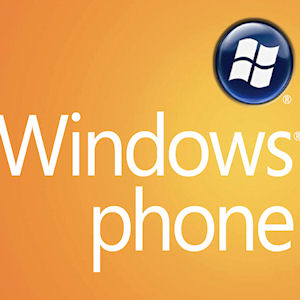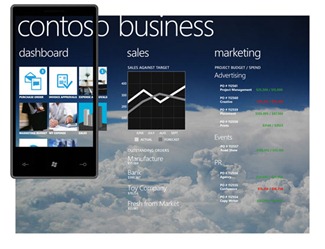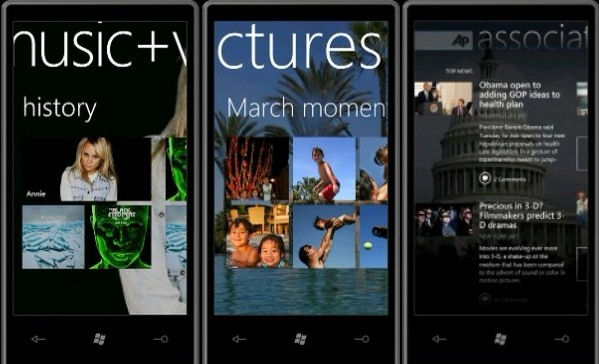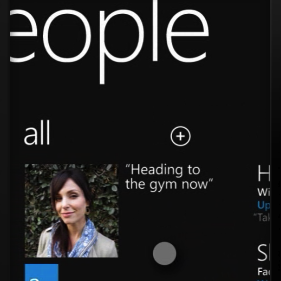
Microsoft: Windows Phone 7 will be GSM-only until 2011
Microsoft said this week that it would not have a version of its upcoming Windows Phone 7 operating system compatible with the CDMA standard at launch. Product manager Greg Sullivan told the Wall Street Journal that the company had decided to focus on GSM initially.
While CDMA is quite popular in the US, and is used by three of the top five carriers in the country, GSM is by far the dominant standard worldwide. Microsoft's decision would likely suppress US sales initially given the market share for GSM here is considerably lower than in other countries.

Microsoft releases final Windows Phone 7 developer tools, shows off launch apps
Windows Phone 7 is only a matter of weeks away, and Microsoft signified this by releasing the final version of the Windows Phone 7 Developer toolkit today.
This final version will let developers bring their applications up to speed for release in the Windows Phone Marketplace which will open in early October, and it also includes the Mobile Advertising SDK for app monetization, and the Bing Maps Control SDK for integrating Microsoft's mobile mapping data, as well as 'Metro' UI design control elements called Panorama (which stretches information out beyond the screen edges) and Pivot (which lets users arrange visual data in different ways.)

Windows Phone 7 is released to manufacturing
Microsoft announced that the highly anticipated Windows Phone 7 mobile operating system has been released to manufacturing on Wednesday, a major milestone for the project.
Following the release of its developer toolkit, Microsoft released Windows Phone 7 technical preview to its developer, carrier and manufacturing partners in July. Since that time, the mobile OS has been updated in a number of ways, such as including intelligent Facebook contact filtering (only real friends show up,) and the ability to "like" Facebook posts from within the People Hub.

Microsoft announces gaming lineup for Xbox Live on Windows Phone 7
At MIX '10 Last March, Microsoft gave an impressive look at Xbox Live integration with the Windows Phone 7 platform. Today, it got even more impressive as Microsoft announced the upcoming lineup of more than 60 Xbox Live games on Windows Phone coming for the Holiday 2010 season.
"Windows Phone 7 is the launch of a major gaming platform for Microsoft," said Matt Booty, general manager of mobile gaming for MGS. "Just like we've done with Xbox 360, our charter is to push the envelope and deliver definitive games that maximize the platform. We will have an incredible lineup of MGS titles, and that's just the beginning."

Microsoft ships Windows Phone 7 devices to developers
Microsoft has finished the Technical Preview of Windows Phone 7, the absolute earliest build of the new mobile operating system that is ready for field testing, and is shipping it out on prototype devices from Asus, LG, and Samsung, the company reported today.
As Microsoft noted last week when it released the updated Windows Phone Developer Toolkit, devices with a pseudo-beta version of Windows Phone 7 have begun shipping to developers, carriers, and partners. The new mobile operating system is still quite a few months away from being ready for release, and there isn't yet a version for consumers to check out, but this marks the "home stretch" for platform development. The company expects the first Windows Phone 7 devices to be released in time for the holiday shopping season this year.

Ballmer: Microsoft will push forward with new tablets, phones
All but admitting his company has fallen behind competitors, Microsoft CEO Steve Ballmer told attendees of its Worldwide Partner Conference Monday that it plans to work hard to bring new tablets and smartphones to the market.
Ballmer's first task in his keynote address was to soften the concerns of partners, who have become more skeptical of MIcrosoft's ability to stay relevant. He said the company is still on track with Windows Phone 7, and that tablet computers from several partners are due within months.

5 things Microsoft should do to save Windows Phone
Friday's apocalyptic post "Windows Phone 7 is doomed" generated among comments assertions that I'm an idiot and demands that I be fired (Sorry, I'm a lowly freelancer). Nevertheless, I do read comments and seriously regard the ones written to extend the discussion (rather than just belittle the author or other commenters). Commenter rwalrond asked: "How about you write an article about how Microsoft can leverage its existing platforms to make WM7 a contender." Actually, Microsoft's trying to leverage its enterprise apps is part of the problem -- the Office and Windows hawks driving off the consumer and cloud service doves. But the spirit of rwalrond's comment is offering solutions, and that I will do here in response.
I don't want to open up a religious debate here, but the Biblical accounts of Nineveh and Sodom and Gomorrah are good metaphors for my "doom" proclamation and Microsoft's mobile future. In that context, I'll call my "Windows Phone 7 is doomed" assertion a prophecy. If Microsoft repents of its wicked ways, the company could end up like the Biblical account of Nineveh, which was spared destruction even after its doom was prophesied. The citizens of Sodom and Gomorrah didn't repent and, according to the Biblical account, they were burned with fire and brimstone. To reiterate: I don't want to open up a debate about God, the authenticity of the Bible or people's lifestyles (why these cities were targeted for destruction). I'm trying to say that Windows Phone 7 doesn't have to be doomed, if Microsoft is willing to radically change its behavior. I don't see much hope in that, particularly given how fast the mobile market is changing and how quickly upstarts Apple and Google are gaining market share and consumer and developer mindshare. So I'm sticking with "doomed," but hoping to be proved wrong.

Windows Phone 7 is doomed
In February, I asserted that Windows Phone 7 "is a lost cause." Matters are worse following this week's KIN killing and late May's Entertainment and Devices division reorganization. Microsoft mobile development has run aground, and at the wrong time. The company is poised to miss two crucial platform transitions that will doom its mobile strategy and assure that the Office-Windows-Windows Server applications stack will join the mainframe in gradual obsolescence.
There's irony here: Microsoft succeeded during the 1990s by driving platform changes that doomed competitors. Companies like Lotus and WordPerfect had market-leading products that fell away after they missed operating system changes that Microsoft lept on (and through its market dominating position helped push forward). Now it is Microsoft that will miss crucial platform changes: Smartphones replacing dumb phones and the mobile Web (including services and resident applications) diminishing the PC's computing and informational relevance.
Microsoft talks up Phone 7 smartphone apps at Internet Week
With previews of the Windows Phone 7 operating system and the launch of Microsoft Expression Studio 4 at Internet Week New York, Microsoft helped to set the stage for a forthcoming smartphone application store aimed at doing a much better job of rivaling Apple's App Store for iPhones and Google's Android Market.
In a speech at the Expression 4 launch in New York City on Monday, Bill Buxton, principal researcher at Microsoft Research, pointed to a day when Windows applications will run across devices ranging from smartphones to TVs, for example, while being outfitted with a series of user interfaces (UIs) geared to the requirements of the specific device, and even to the preferences of specific users.

After two high-profile Microsoft exits, is WP7 a device or a platform?
When a massive Microsoft corporate reorganization on September 20, 2005 vaulted Robbie Bach into the role of President of the Entertainment & Devices division, the explanation at the time was to enable the company to focus on devices where the goal was to promote devices, and on platforms where the goal was to promote devices. Xbox was a device, whatever MP3 player the company would decide to produce was a device, and obviously cell phones are devices should Microsoft ever choose to enter that business in earnest.
Obviousness is highly susceptible to changes in perspective, especially over five years' time. Today, with the launch of one of the company's most important gaming initiatives, still called "Project Natal," just months away, Bach has decided to leave the company, Microsoft confirmed this afternoon. Following in his wake will be Microsoft's other high-profile gaming executive, J Allard, who leaves behind a real personal triumph in the form of XNA, the gaming platform that may yet unite development for Xbox 360, Windows, Windows Phone, and to some extent Zune.

Windows Mobile 6.5 may suck, but Microsoft is hoping free Office Mobile will stop users from switching phones before Windows Phone 7 is ready
There is a lot of anticipation for Windows Phone 7, but little reason for new phone buyers to pick up a Windows Phone right now. Even with the extremely attractive and powerful HTC HD2, users won't be able to upgrade their devices to Windows Phone 7 when the new OS hits the market at the end of this year. It's quite a dead end.
Therefore, Microsoft has been working on sweetening up the Windows Mobile 6 environment by dishing out free software. Yesterday, the Redmond company announced that Windows Mobile 6.x users would be getting turn-by-turn navigation for free, today, the software giant announced that Office Mobile 2010 is now a free upgrade for all Windows Mobile 6.5 users with the previous version of Office Mobile.

Microsoft group shift confirms consumer-centric approach to Windows Phone 7
Windows Mobile was never just a consumer product; it was also a significant player in handheld terminals, in-vehicle systems, and ruggedized consoles for business and industry.
But that whole branch of business-oriented Windows Mobile devices used to be overseen by Microsoft's Mobile Communications Business group (MCB), the same group responsible for Windows Mobile-powered consumer devices, despite the fact that they were very different.

Hey, Apple, Microsoft, mobile multitasking is a necessity
Apple's "Get a sneak peak into the future of iPhone OS" event, in two days, is reason enough to re-raise the thorny topic of multitasking on smartphones. Apple's iPhone OS 3.x -- on iPad, iPhone and iPod touch -- limits running background applications. Microsoft is taking a similar approach with Windows Phone 7 (Thank God, the company dropped "Series" from the name).
Here's where I whack aside the head my former analyst colleague, Michael Gartenberg -- or you can whack me (in comments) if you agree with him. Gartenberg and I are polarized on the topic of mobile multitasking. He thinks it's unnecessary, I say it's a necessity. In March 25 post "Windows Phone 7 Series imitates Apple's iPhone in the worst ways," I asserted: "People take multitasking for granted on the PC, which will make its absence more noticeable on the smartphone." I'd argue that because of applications' or features' contextual appeal, running background applications will increase in appeal over time. There are reasons why Google, Nokia or Palm operating systems allow multitasking, and seem to do so without any major hit on battery life (I've tested Android, Maemo and Symbian devices, but not WebOS).

Windows Phone 7 Series imitates Apple's iPhone in the worst ways
For years, people have accused Microsoft of being an imitator, rather than innovator. Finally there is evidence: The ways Windows Phone 7 Series imitates the very worst of Apple's iPhone. Unless there is the strangest of coincidences -- like two students having the same wrong answers on a high school history test -- Microsoft is imitating Apple, using the same strategy to make the same mistakes. It's either imitation or incompetence, and out of fairness I assume the former.
The first imitation is the most baffling: Limited multitasking. Like iPhone, Windows Phone 7 Series will allow multitasking for some of its own applications, but not others. When open but not in use, third-party apps go into a pseudo-off ("dehydrated") state. By comparison, Google's Android, Nokia's Maemo or Symbian OS and Palm's WebOS all multitask (e.g., run background applications) just fine.

Windows Phone 7 Series actually looks pretty good
Zune -- along with Expression Blend, Silverlight, Visual Studio and XNA -- may yet save Windows Phone 7 Series. During the kick-off MIX10 keynote earlier today, Microsoft product managers showcased features, development scenarios and, most importantly, user experiences derived from Zune HD. Perhaps Windows Phone 7 Series isn't a hopelessly lost cause after all. Microsoft's competitive postion would actually look good, if phones were shipping now and not in six to eight months.
In September, I asserted that Zune HD should have been the Microsoft phone. The user interface and user experience (some of that derived from Zune 4.0 software) is exceptionally good -- particularly coming from Microsoft. Finally, Microsoft is carrying forward and extending a great user interface motif. Better: Windows Phone 7 Series is inheriting and extending the social sharing concepts imbued into Zune 1.0.
